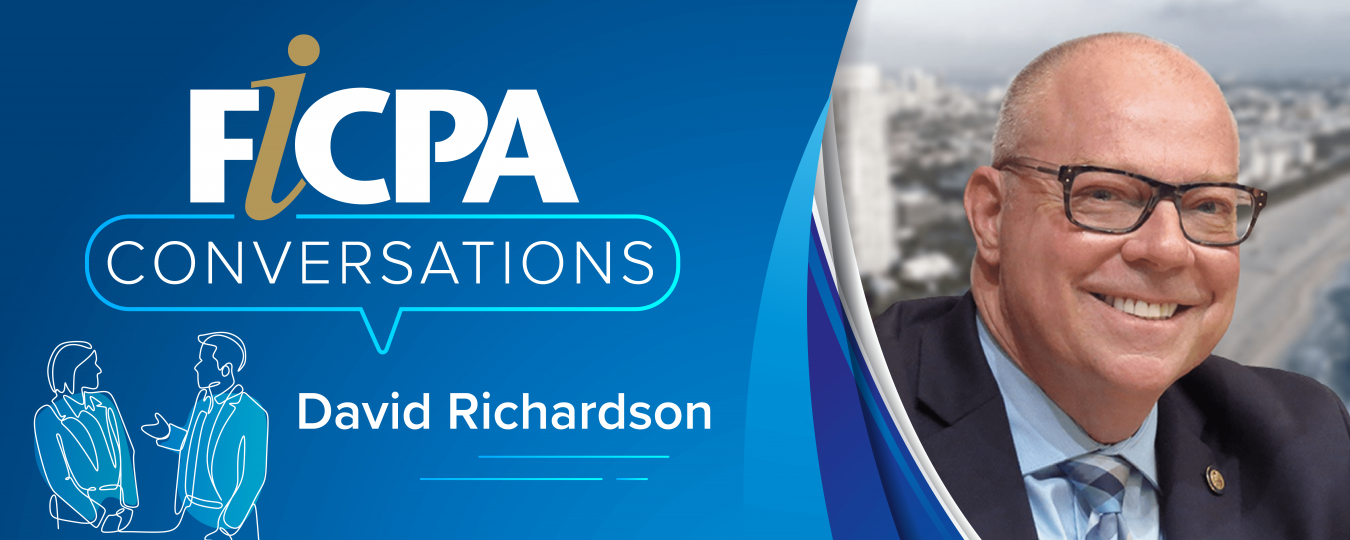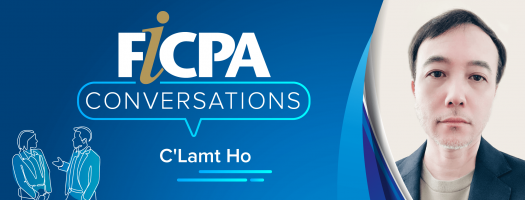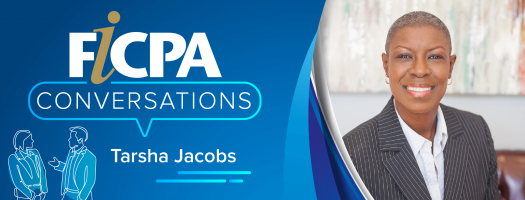
Our FICPA Conversations series returns with an active member of the FICPA and a former member of Florida’s legislature.
David Richardson in 2012 became the first openly gay individual ever elected to the Florida House of Representatives and spent the next six years serving his Miami-area district.
Now a Miami Beach commissioner, Richardson is filling his time in the month of June like a lot of other CPAs – catching up on CPE ahead of the June 30 deadline.
He was nice enough to take a break and speak with us about his career, his time in office, the value of the FICPA’s advocacy efforts, and the importance of D&I, both in business and public service.
Tell us a bit about how your career unfolded. What was it prompted you to make the transition from business to politics?
I started my career as an auditor for the Pentagon in the state of Florida when I was right out of school, and I did that for about four and a half years. I was contacted by Arthur Young, which was one of the Big 8, and they offered me a job with their consulting practice in New York City, doing government contracts and advisory services. After two years in New York, I went to Washington D.C. for three more, and then started my own firm, doing government contract accounting advisory services; that was my area of expertise. As a pentagon auditor, I was with the Defense Contract Audit Agency, which is a civilian agency, part of the Department of Defense. I became an expert in government contract accounting, pricing and finance, and I had already done litigation support services, so my firm was rapidly growing in that area. I spent 80-90% of my time doing litigation support services and expert witness testimony on disputes concerning government contracts. I had my firm for about 15 years.
Then, at the age of 50, I retired from my practice and decided I wanted to do something else, even though I didn’t know what that something else was going to be. I had already moved to Florida. I grew up in Orlando and came to Miami to work on a consulting project in 1995 and ended up buying a small apartment – so I knew I wanted to live there.
I’d always been interested in politics, and the state representative office became available. I decided to run for that seat. At the time, the district was Miami Beach, downtown Miami, and another small city called North Bay Village. It was a four-way race. I made the decision to run, and 13 weeks later I won.
That’s a pretty big decision and pretty short period of time. What were your expectations when you decided to throw your hat in the ring?
I was kind of watching. I remember when the person in that seat resigned and the governor decided not to have a special election and to wait for the regular cycle. One by one, some of the local elected officials who were going to run decided not to. I got some encouragement from friends, and I knew it would be possible for a newcomer to win, because none of the people running had any experience either. They were sort of in my situation. I think I filed the day before the deadline, and I won on Aug. 14, 2012. I’m a Democrat, and there wasn’t a Republican or an Independent running in the race, so when I won the primary in August, it was over.
That made you the first openly gay candidate to win a Florida House seat. By the time you were sworn in, you and a colleague, Joe Saunders, were the first gay Florida House representatives to take office. What significance did that have to you at the time?
I’m proud of it. Joe won in November, so I kind of get the title of “first elected,” since my race was over in August. I got up, the day after I won, and there were 100 newspapers and media outlets calling me. Now there have been – I don’t know – a half-dozen others who have been elected. You know, it only took 174 years for that to happen, so it is something I’m quite proud of.
I’m also proud that it didn’t become an issue in the campaign. When I made the decision to run, I knew there was going to be a certain loss of privacy. I remember the Miami Herald wore an article about the four candidates and referred to me as the “Openly Gay CPA,” which I found to be interesting, because I don’t know that they had ever described anyone else as “openly straight.” But that’s how they described me, and it didn’t become an issue. I didn’t get any hate mail. I didn’t get any negative attacks from my political opponents about my sexual orientation. It just didn’t even come up, and it didn’t come up in my re-elections either.
How have you noticed both worlds – accounting and public service – change over time with respect to diversity, equity and inclusion, particularly for members of the LGBT community?
I think it’s a lot more open now. When I was a senior manager with Ernst & Young, there was no opportunity in the firm to express yourself. There were no Pride groups, like there are now, or anything like that, so people stayed hidden, hoping no one would find out who they really are. I remember going through the E&Y partners directory; there were a few women, but it was mostly men, and they all mentioned their wives. It was pretty clear that was part of the demographic. Even when I started my own firm, I was very careful about my personal life. It was law firms, primarily, who were hiring me as an expert witness, and I didn’t want them to discriminate against me and so forth. But I was pretty good at what I did, and I think most people felt that if they didn’t hire me, then I’d be on the other side of them in court. Eventually, all those same law firms wanted me as their witness. At that point, if someone would ask, I wasn’t shy about sharing my orientation because there was nothing they could really do to hurt me, financially or emotionally.
When I decided to run for office, I was already on one of the boards of the Victory Fund, a national group whose mission is to get openly gay individuals elected to public office. As I said, it wasn’t an issue in the election, but when I won, a pretty far-right conservative said it would be wise for me to come to Tallahassee and to keep my head down and be quiet. It’s funny, because later, after this person got to know me, he came to the House floor one day and said, ‘You know what? You’re a really good member of the House, and I’m really glad you’re here.’”
You have a unique point of view as both a member of the House and a member of the FICPA. Can you speak to the strength of the FICPA’s Governmental Affairs efforts and explain just how valuable advocacy is to our members?
OK, that’s a really great question. Most people who are a part of an association, they don’t know the day-to-day details of everything that association is doing. I got to see it firsthand as a legislator, because the Government Affairs team was in the Capitol every day during the legislative cycle. They were tuned into everything that possibly affect CPAs in Florida. It’s incredibly beneficial. Some organizations don’t have the ability to support a team who can be in Tallahassee. Then something happens, someone proposes a law or a regulation that will affect their business, and their voice isn’t heard. It’s one of the most valuable things the FICPA does for its members – monitoring what’s going on in the legislature and being able to react immediately.
You mentioned the Victory Fund and their efforts to propel LBGT candidates into office. Whether it’s in accounting or politics, what in your mind is the net result of having a diverse collection of voices in any given room?
I believe we can learn something from everyone. Just by my being in the room as openly gay person, people get the opportunity to know me, and it can break down stigmas. I had some pretty far right colleagues in Tallahassee who didn’t have a lot of experience interacting with gay people and feeling comfortable enough to ask general questions about the community. I remember someone asking, “What does LBGT stand for? What does that mean?” I always gave my colleagues license to ask me questions. As it turned out, I ended up becoming friends with a number of Republican colleagues who don’t share my values in terms of public policy. It created an opportunity to feel comfortable asking questions and listening to different perspectives.

